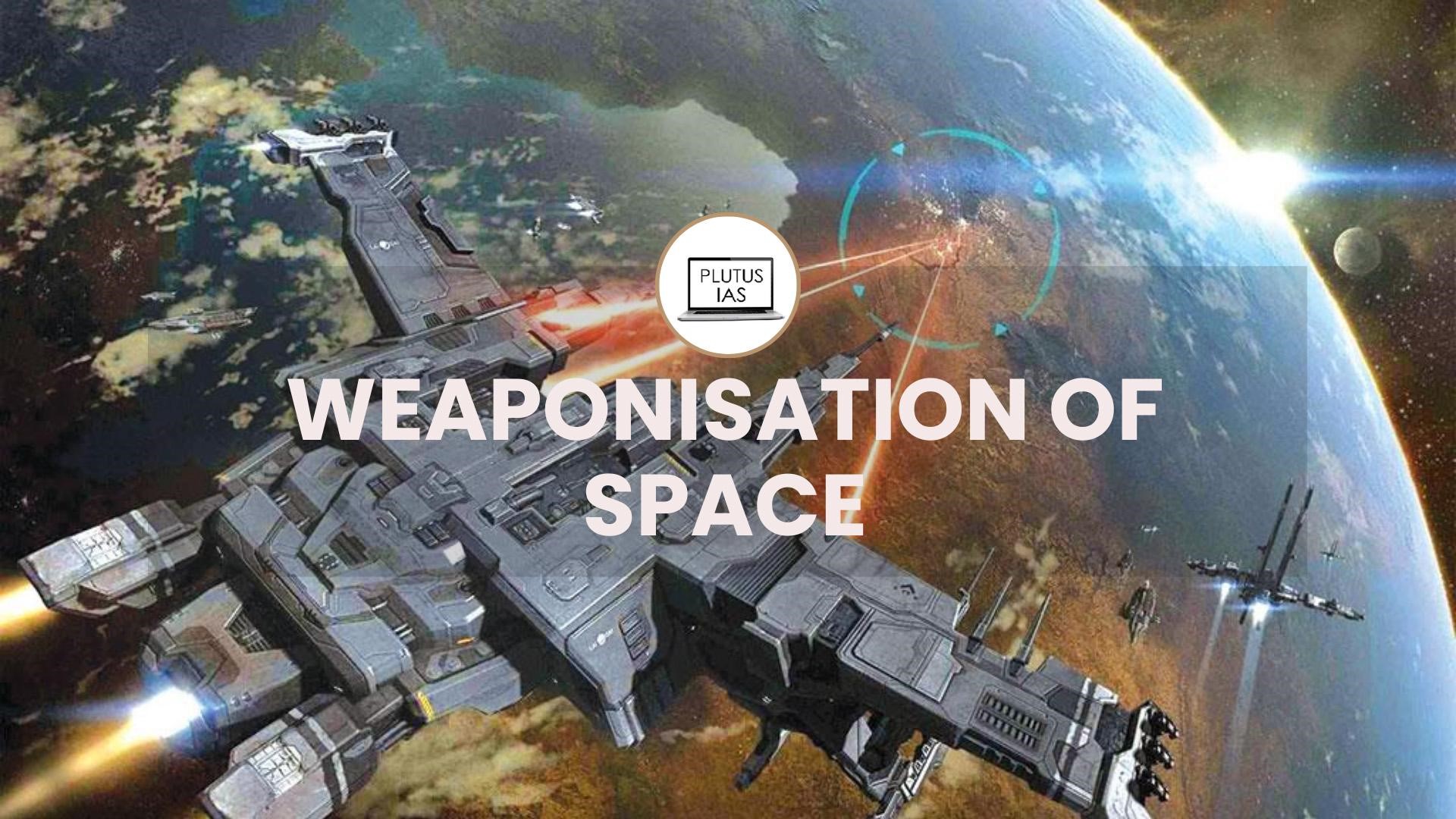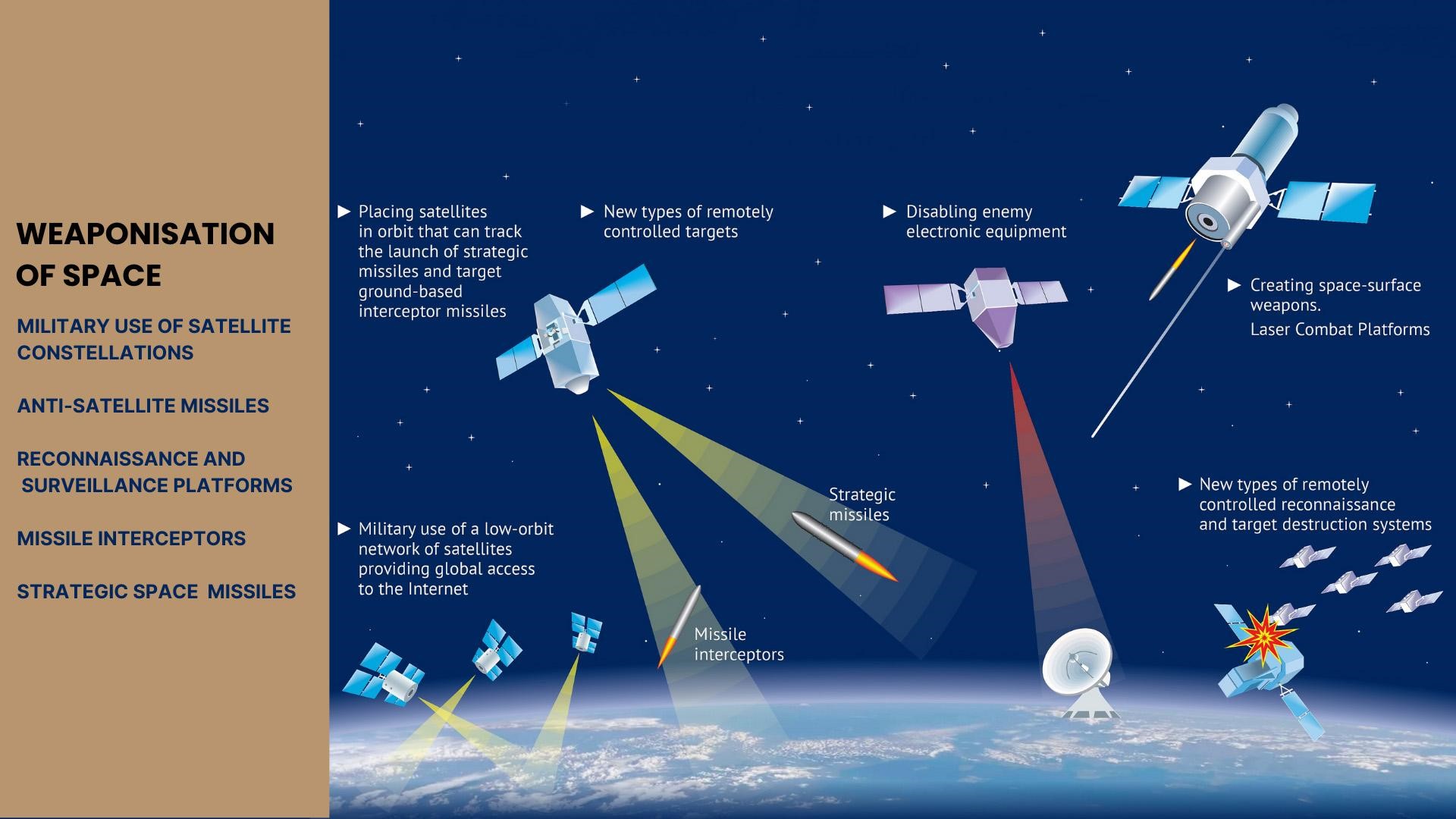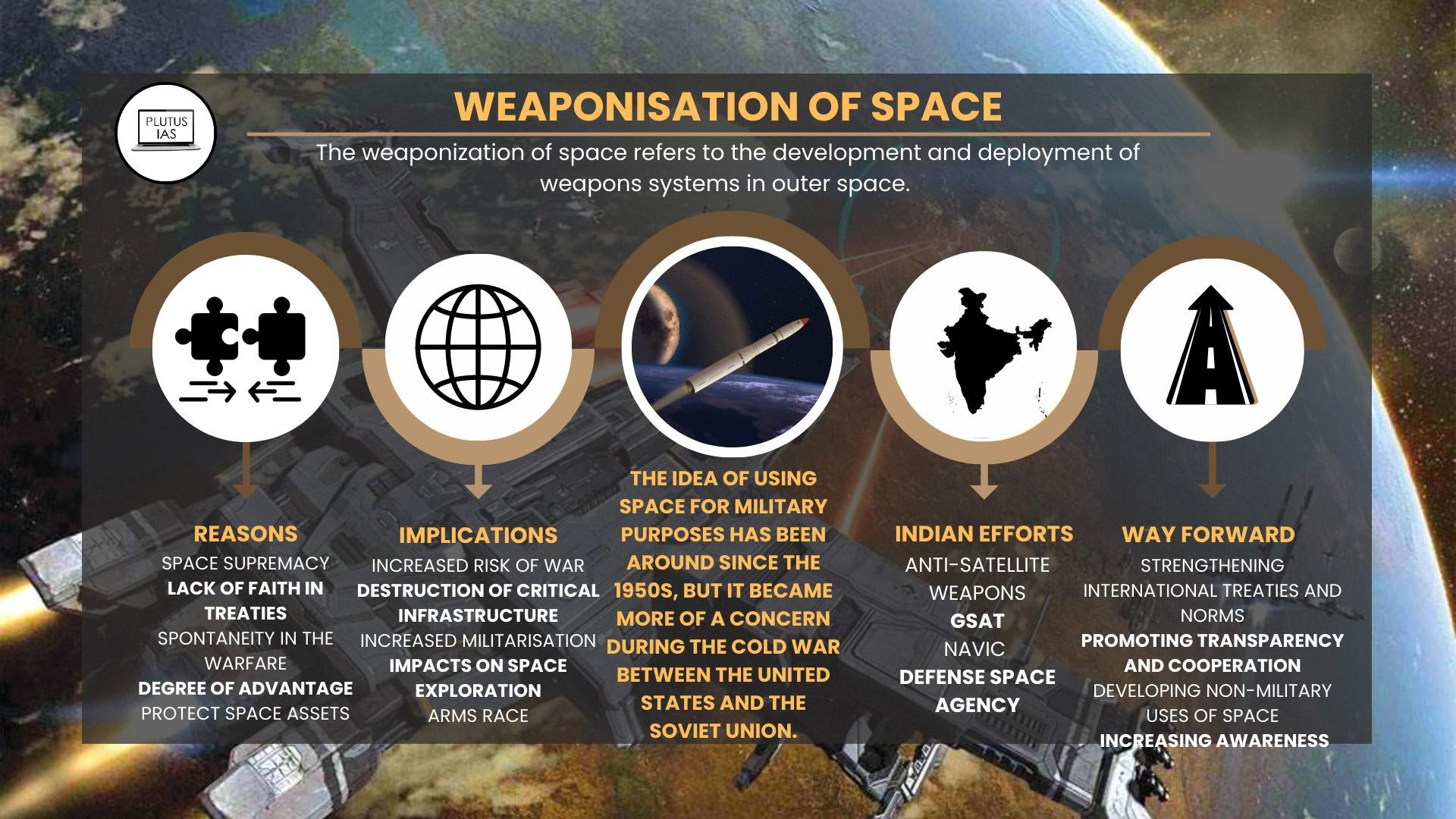12 Apr Weaponisation of space
Weaponisation of space
This article covers “Daily Current Affairs for UPSC” and the topic details “Weaponisation of space”. The topic “Weaponisation of space” has relevance in the “Security” section for the UPSC CSE exam.

Weaponisation of space
Weaponisation of space
For Prelims:
What is the Weaponisation of space?
What is the difference between the weaponisation of space and the militarisation of Space?
What are India’s efforts in the direction of the Weaponisation of Space?
For Mains:
GS 3: Security Issues
What is the result of the Weaponisation of space?
What are the global legal treaties to stop Weaponisation of space?
What is the way forward for a peaceful outer space and stop Weaponisation of space?
Why in the news?
The Chief of Staff said that the world is witnessing the militarization of space and will slowly head toward the weaponisation of space.
What is the Militarisation of Space?
It refers to the use of outer space for military purposes, including the deployment of military assets such as satellites, weapons, and communication systems.
The term generally refers to the integration of space capabilities into military planning and operations, as well as the use of space-based assets for intelligence gathering, surveillance, and navigation.
What is the Weaponisation of space?
The Weaponisation of Space refers to the development and deployment of weapons systems in outer space. It is the next level of militarisation and envisages a situation where space is being used for military warfare. In this term, it can be said that space becomes the new frontier of war.

Weaponisation of space

Reasons on Weaponsation
What are the reasons behind the trend of the Weaponisation of Space?
- Desire to achieve space supremacy.
- Lack of faith in the space peace treaties.
- To involve a degree of spontaneity and element of surprise in the warfare.
- To gain relative military advantage over those nations that do not have space-based military capabilities.
- To preserve the space investments in space like satellites etc from attacks.
What are India’s efforts in the direction of the Weaponisation of Space?
India is working in the direction to develop its space-based military capabilities which include the following steps:
- Development of anti-satellite weapons: India has developed and tested anti-satellite (ASAT) weapons, demonstrating its ability to shoot down low earth orbit (LEO) satellites in 2019.
- The test, known as Mission Shakti, involved launching a ground-based missile that successfully destroyed a live satellite in LEO. India became the fourth country after the US, Russia, and China to demonstrate this capability.
- Development of other space-based military assets: India has also developed a number of other space-based military assets, including satellites for communication, navigation, and reconnaissance purposes.
- For example, India has a constellation of military communication satellites called GSAT, which are used for secure voice and data communication by the armed forces.
- India has developed NAVIC which is a navigation system which has its role for military purposes.
- Formation of Defense Space Agency (DSA) in 2019.
What are the implications of the Weaponisation of space?
The weaponisation of Space is not a good sign for warfare in the future. Till now the conventional wars fought on land has certain limitations of space and time. Till the time the full mobilisation is not done by the countries there is a scope for diplomatic channels to play a role in de-escalating the issue. The other implications are as follows:
- Increased risk of war: The deployment of weapons in space could increase the risk of conflict between nations. If one country perceives a threat from another nation’s space-based weapons, it could lead to an escalation of tensions and potentially even to armed conflict.
- Destruction of critical infrastructure: Space-based weapons could potentially destroy or disable critical infrastructure, such as satellites that provide GPS, weather, or communication services. This could have a significant impact on national security, as well as on the global economy.
- Increased militarization: The development and deployment of space-based weapons could lead to an increase in military spending and the militarization of space. This could divert resources away from other important areas, such as healthcare, education, and infrastructure.
- Impacts on space exploration: The weaponization of space could also have negative impacts on space exploration and scientific research. If space becomes an arena for military conflict, it could lead to restrictions on the use of space for peaceful purposes, such as scientific research or commercial activities.
- Arms race: The deployment of space-based weapons could lead to an arms race between nations, similar to the nuclear arms race during the Cold War. This could further increase tensions and instability in international relations.
What are the global legal treaties to stop Weaponisation of space?
Outer Space Treaty: This treaty was signed in 1967 and it prohibits the placement of nuclear weapons or any other weapons of mass destruction in orbit around the Earth, on celestial bodies, or in outer space in general. It also prohibits the use of the moon and other celestial bodies for military purposes.
What is India’s role in the pursuit of peaceful outer space and in preventing the weaponisation of space?
India has emphasized the peaceful uses of outer space and has stated that its ASAT test was a demonstration of its technological capabilities and not intended to escalate tensions in space.
India has also advocated for international cooperation in space exploration and development, as well as efforts to prevent the weaponization and militarization of space.
India has been active in international forums such as the United Nations Committee on the Peaceful Uses of Outer Space (UN COPUOS) and has supported efforts to establish norms and guidelines for responsible behavior in outer space.
In 2020, India co-sponsored a UN resolution on preventing an arms race in outer space, which called for the prevention of the placement of weapons in outer space and for the peaceful use of outer space for the benefit of all countries.
Way Forward
There is a need for a collaborative and multifaceted approach that involves strengthening international treaties, promoting transparency and cooperation, developing non-military uses of space, increasing awareness, and establishing international norms. By working together, the international community can ensure that space remains a peaceful and beneficial domain for all humanity.
Source:
Daily Current Affairs for UPSC
Reading daily current affairs consistently helps the UPSC aspirant of enhancing their skills. Plutus IAS helps aspirants by providing quality content and the latest news for their UPSC exam preparation. So, Get the latest daily current affairs for the UPSC examination from Plutus IAS. Also, read weekly and monthly current affairs for the UPSC exam preparation.
plutus ias current affairs eng med 12 April 2023



No Comments